Emails: Crockery Lake contract was 'rushed,' intended to prevent new board from dismantling deal
Internal emails show that the contract was crafted in less than two months, with only select officials involved in the process — including the contractor who will receive the funds to complete the work.
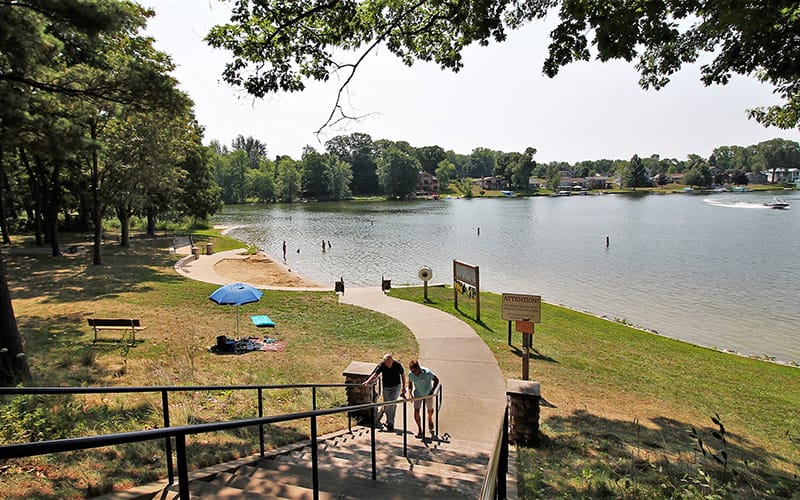
OTTAWA COUNTY — A controversial contract Ottawa County awarded for more than half a million dollars for an inland lake’s restoration was crafted by Ottawa Impact officials and loyalists with two priorities in mind: It had to be completed before the end of the year and written in a way to prevent incoming commissioners from undoing the deal, internal emails show.
The Ottawa County Board of Commissioners, led by its current OI majority, voted Dec. 10 to give more than $560,000 to Chester Township to “revitalize” Crockery Lake.
The far-right fundamentalist group was formed by Joe Moss and Sylvia Rhodea in 2021 after they took issue with pre-K-6 school mask mandates during the COVID-19 pandemic.
Read More: Ottawa County approves $563K contract to restore Crockery Lake as process faces criticism
To commissioners not in the OI majority on the board, the contract seemed sudden with little public process. They expressed deep concerns about language in the contract that gave the county little control over the project and increased liability should the lake cleanup go wrong.
Internal emails show that the contract was crafted in less than two months, with only select officials involved in the process — including the contractor who will receive the funds to complete the work.
And the goal was to ensure that new commissioners — set to be sworn in Thursday — would not be able to stop the project.
“We want to make sure that once the funds are transferred on this project, that there's not the ability for the project to easily terminate or cease,” Interim County Administrator Ben Wetmore wrote in a Dec. 3 email. “We intend to be bound to this agreement.”
How we got here
Spring Lake limnologist Jennifer L. Jermalowicz-Jones submitted a lake-remediation proposal through her company, Lake Restorative Services, to the Crockery Lake Association in October.
Jones was familiar with at least some of the OI commissioners by then, having run for a seat on the Spring Lake Board of Trustees in the 2024 fall election cycle.
As part of her campaign, Jones published a website called SaveSpringLake.org, which was sponsored by the political action committee The Voice of Spring Lake. Among the committee members listed on Jones’ Save Spring Lake Committee was Moss, who was re-elected in November.
Public discussion on the Jones proposal began in earnest at the county’s finance committee on Dec. 3, however, the packet provided to the public only included a contract between Chester Township and the county — not Jones’ plan on which the contract was based.
The contract drew concerns from Joe Bush, the county’s water resources commissioner, and attorney Stacy Hissong, general counsel for the Michigan Association of County Drain Commissioners.
Hissong asked commissioners at the Dec. 3 committee meeting who would be the owner of the contract — the county or the township — because it was not immediately clear in the existing language.
She also pointed to the lack of having the Jones plan accompanying the contract.
“It says the county board of commissioners has authorized the Crockery Lake restoration project to be designed and implemented by the company, and that's known as the contract as the project,” Hissong said. “And so … I'm not aware of an authorization of that contract between the county and Lake Restorative Services, and it's not attached as the document that the township is administering. So I just had some questions about that.
Dec. 2, 2024, Finance and Administration meeting
“I'm not sure what review of the contract has taken place between the county and Lake Restorative Services,” she said.
Hissong also said the contract lacked language addressing what happens if RLS is unable to secure the proper environmental permits.
“What if there's an unusual circumstance that a permit is not given, and so there can't be that type of work? This agreement doesn't provide for those funds being put back,” she said. “It doesn't have a timeframe.”
She also said she was “taken aback” by language in the contract between the municipalities that indemnified the township, a legal term where one party (the county) promises to compensate another party (the township) for losses, damages or liabilities.
Despite the numerous questions and concerns raised at the Dec. 3 committee meeting, the OI members who hold majorities on all of the county’s committees, voted to advance the contract to the full board.
Wetmore assured commissioners that the “minor” issues could be reworked and resolved prior to the board’s next full meeting scheduled for Dec. 10.
When the full board met, minority members expressed frustration over what they described as a problematic process that felt rushed.
“There are many members of this board who have not been part of this process, and this is the exact moment where we are being brought into this process,” Commissioner Doug Zylstra said at the Dec. 10 meeting.

Wetmore said sending the contract back would be “undoing a lot of legwork that has gone into this and a lot of negotiation to get everyone focused on this.”
Zylstra said that may be true, but that he and other minority board members had no knowledge of the project and had nearly no time to review it prior to the full board voting on the contract.
“So you may say it's been a long process, but until today, we've not been a part of that. So while I do appreciate your work on this, you know, there's a lot of folks here not on (the) finance (committee), we're not part of the discussion inside finance and outside of finance, and this is our first attempt to look at it,” he said.
What we know now
The contract between the county and Crockery Lake was first discussed in October between township and county officials and lawyers.
According to an email sent from township attorney Ronald Redick, of Grand Rapids-based law firm Mika Meyers, an initial meeting with attorneys from both units of government and “county commissioners” took place Oct. 15, where the county asked Redick to draft an initial contract.
The request came as a surprise to Redick.
“With regard to the contract development process, I would appreciate your thoughts on how you see that process initiating and progressing. As I mentioned yesterday, we will likely be able to provide a starting template, but anticipate that the County will do most of the drafting after that point, with our review of the same, for the Township. That was the expectation of Township officials coming into this process,” Redick wrote on Oct. 16 to county attorneys Jack Jordan and Lanae Monera.

“In fact, we had thought that the County might have had a draft contract ready for initial discussion at yesterday's meeting. Since we are instead starting at ground zero, I thought it might be good to have expectations established from the start, about work allocation. Related to this, because the Township will incur legal fees in the contract drafting, we anticipate that a feature of the contract will be County reimbursement of those reasonable fees,” Redick wrote.
In the email, Redick expressed concern about the “aggressive” timeline he said was requested by commissioners, although he doesn’t specify which county commissioners attended the meeting.
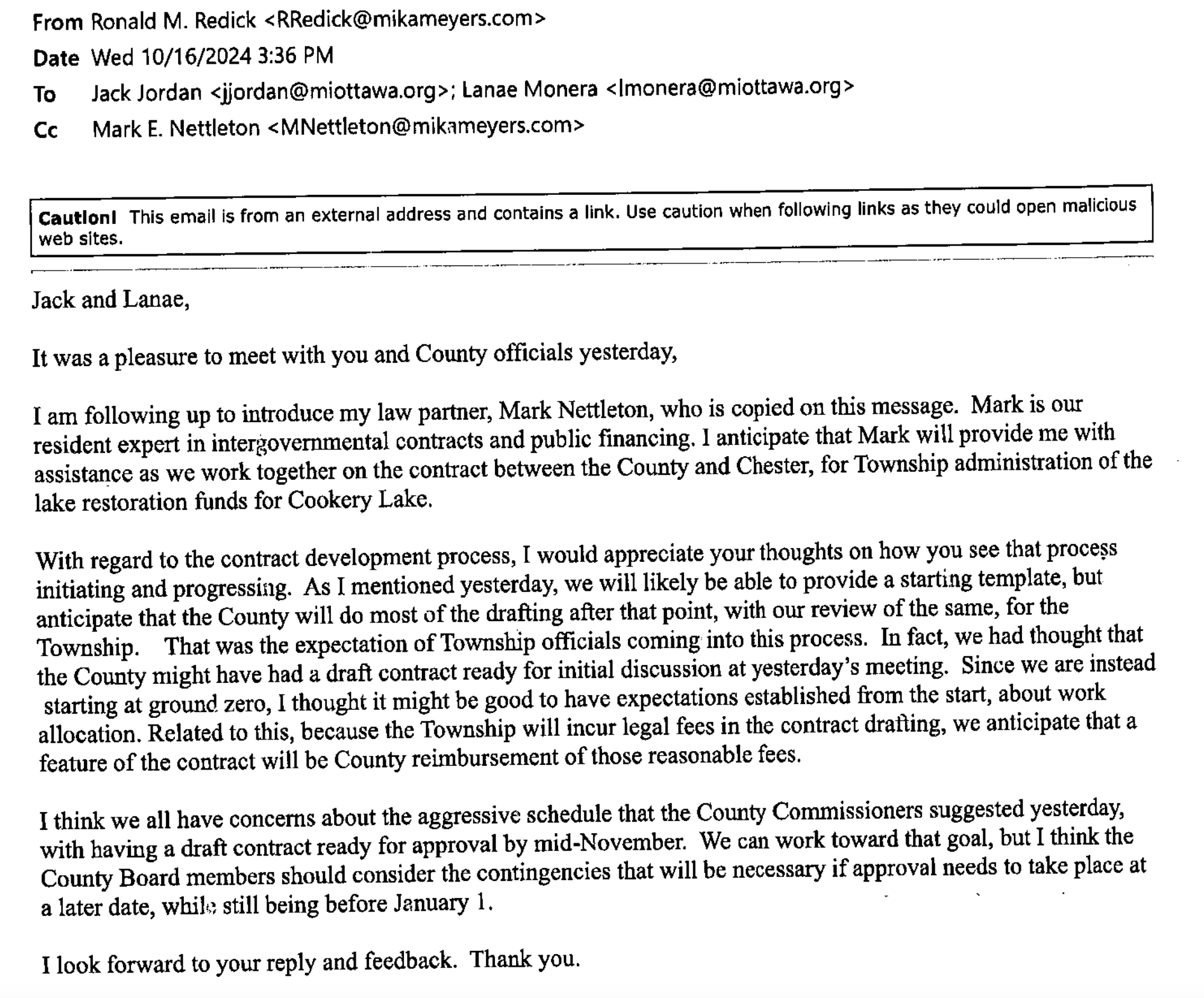
“I think we all have concerns about the aggressive schedule that the County Commissioners suggested yesterday, with having a draft contract ready for approval by mid-November. We can work toward that goal, but I think the County Board members should consider the contingencies that will be necessary if approval needs to take place at a later date, while still being before January 1,” Redick wrote.
Meanwhile, OI Commissioner Allison Miedema, who represents the district that includes Chester Township and Crockery Lake, was reassuring Crockery Lake Association members of her support of the project.
“Currently, there is a majority on the Board of Commissioners that seeks to simply do the right thing by the people and caring for our environment, not caving to pressures or false information being spread,” Miedema wrote Crockery Lake resident Betsy Ludwick on Oct. 30.

The emails were obtained through a Freedom of Information Act request filed by a county resident, who then provided the documents to Ottawa News Network. Read through the documents here.
By early November, Redick sent an initial draft to Jordan and reiterated his concerns over the accelerated timeline.
“Please note that I rushed through the drafting process, giving higher priority to speed (given the County’s interest in authorizing this before year’s end), rather than to 100% accuracy,” Redick wrote to Jordan in a Nov. 7 email. “As such, I have not submitted it to my assistant for proofreading. There might be some typos here and there.”
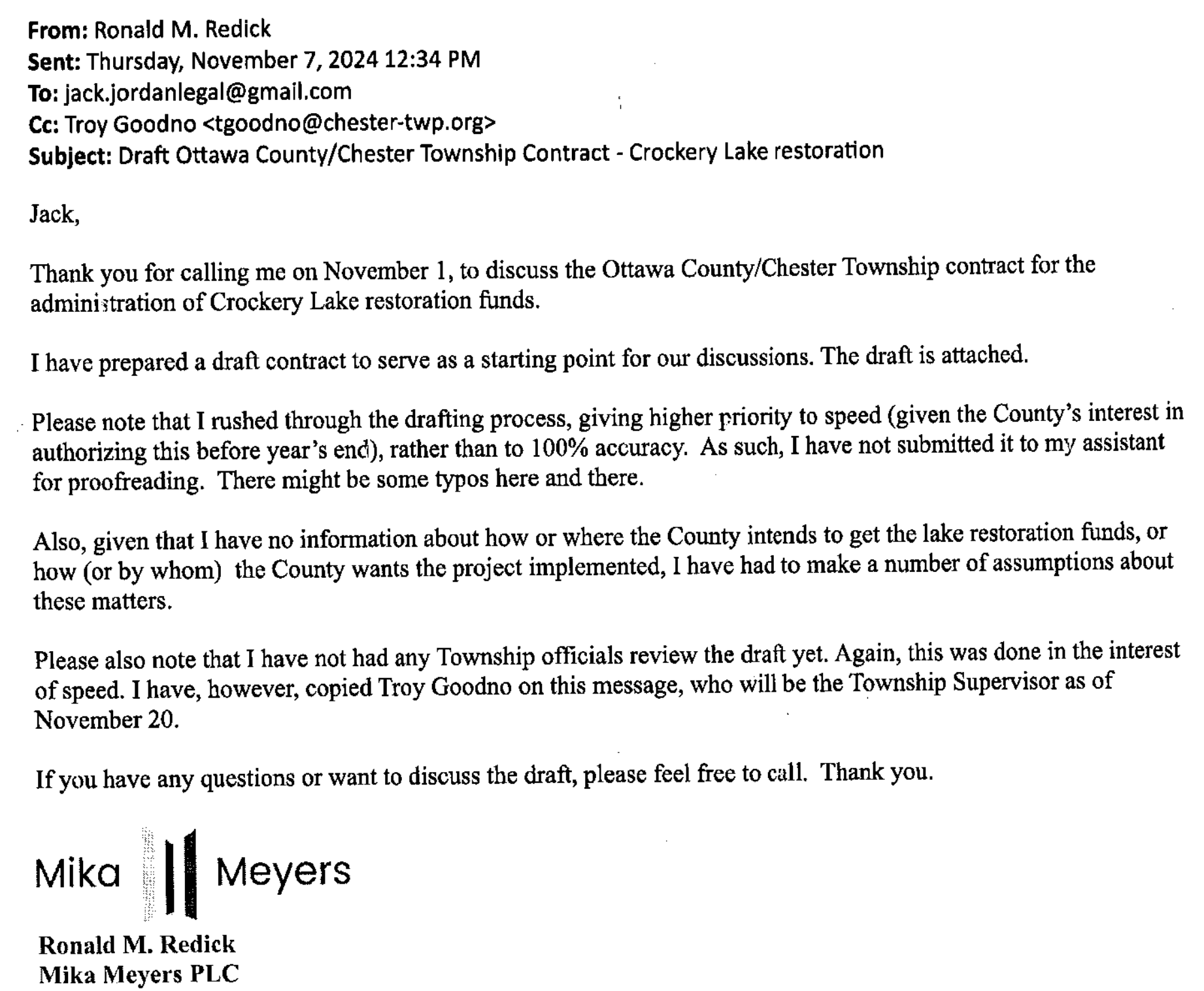
Subsequent emails also show that Jones was directly involved in the contract negotiations.
“Ron, I just spoke again with Ben Wetmore, Ottawa County Administrator interim, and he would like a copy of the agreement as it stands now,” Jones wrote to Redick, Wetmore and Chester Township Supervisor Goodno on Nov. 15. “We will be reviewing it next week to get things moving.”
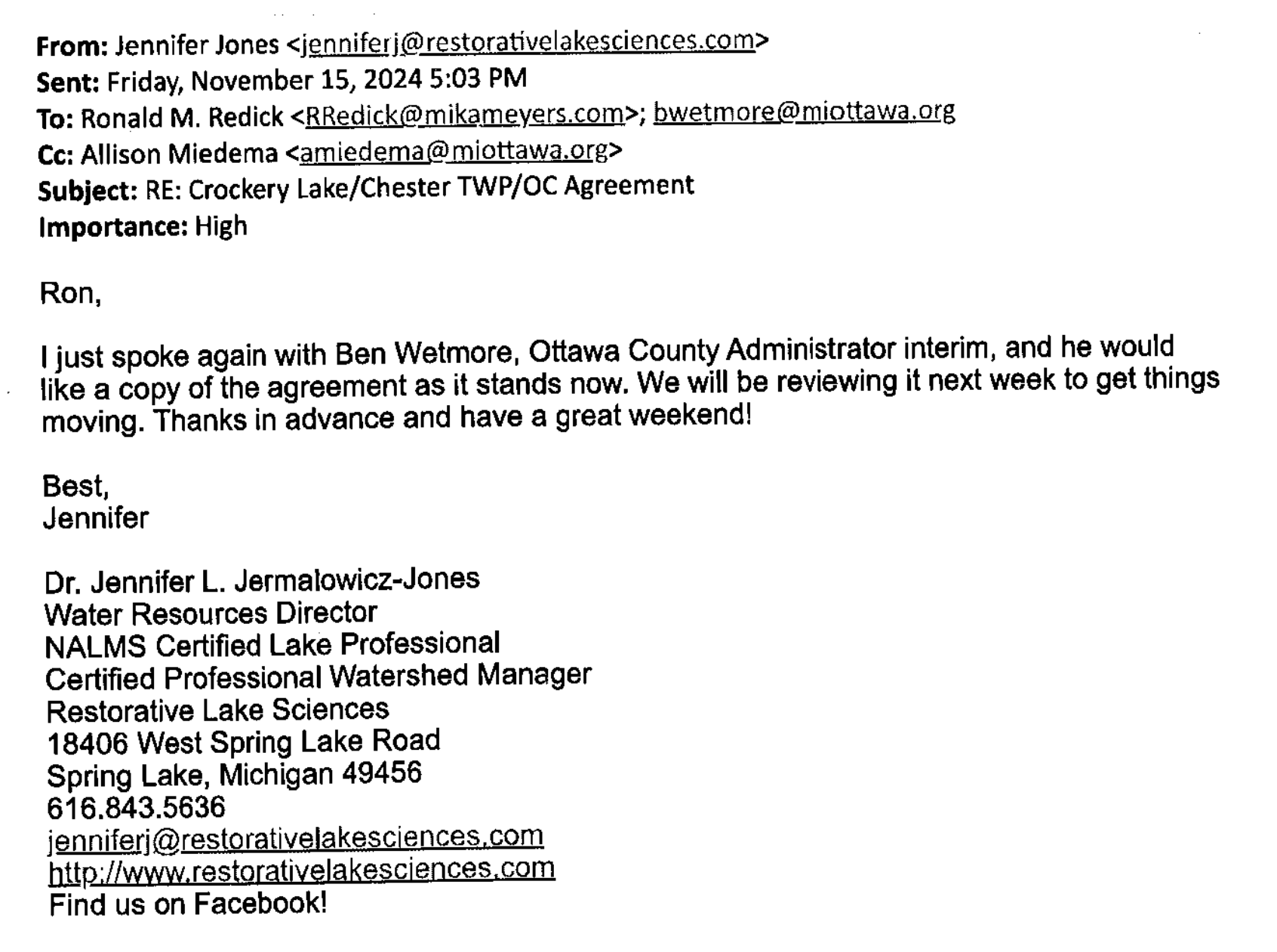
Redick responded Nov. 18, this time copying in Miedema: “Jennifer, It was a pleasure to speak with you on Friday. Attached is a copy of the draft agreement, along with the e-mail I sent to Jack Jordan on November 7, when I first transmitted the draft to him.”
Over the next few days, between Nov. 20 and Nov. 25, Wetmore coordinated a Teams call between himself, Miedema, Jones, Redick, Moss, Jordan and Goodno.
“All: Jack called to say he’s going to have a hard time making the call today, but others have said we want to keep the time to keep the ball rolling. So please plan on being on the Teams call at 3:30 p.m. Thanks!” Wetmore wrote to the group on Nov. 25.
After the Thanksgiving break, Wetmore initiated a thread of emails with Redick (copying in Goodno) insisting that the contract language be modified to prevent the contract from being undone once completed.
“We want to make sure that once the funds are transferred on this project, that there's not the ability for the project to easily terminate or cease. We intend to be bound to this agreement, in other words. Do you have any suggested language that would capture that intent?” Wetmore wrote in a Dec. 2 email.
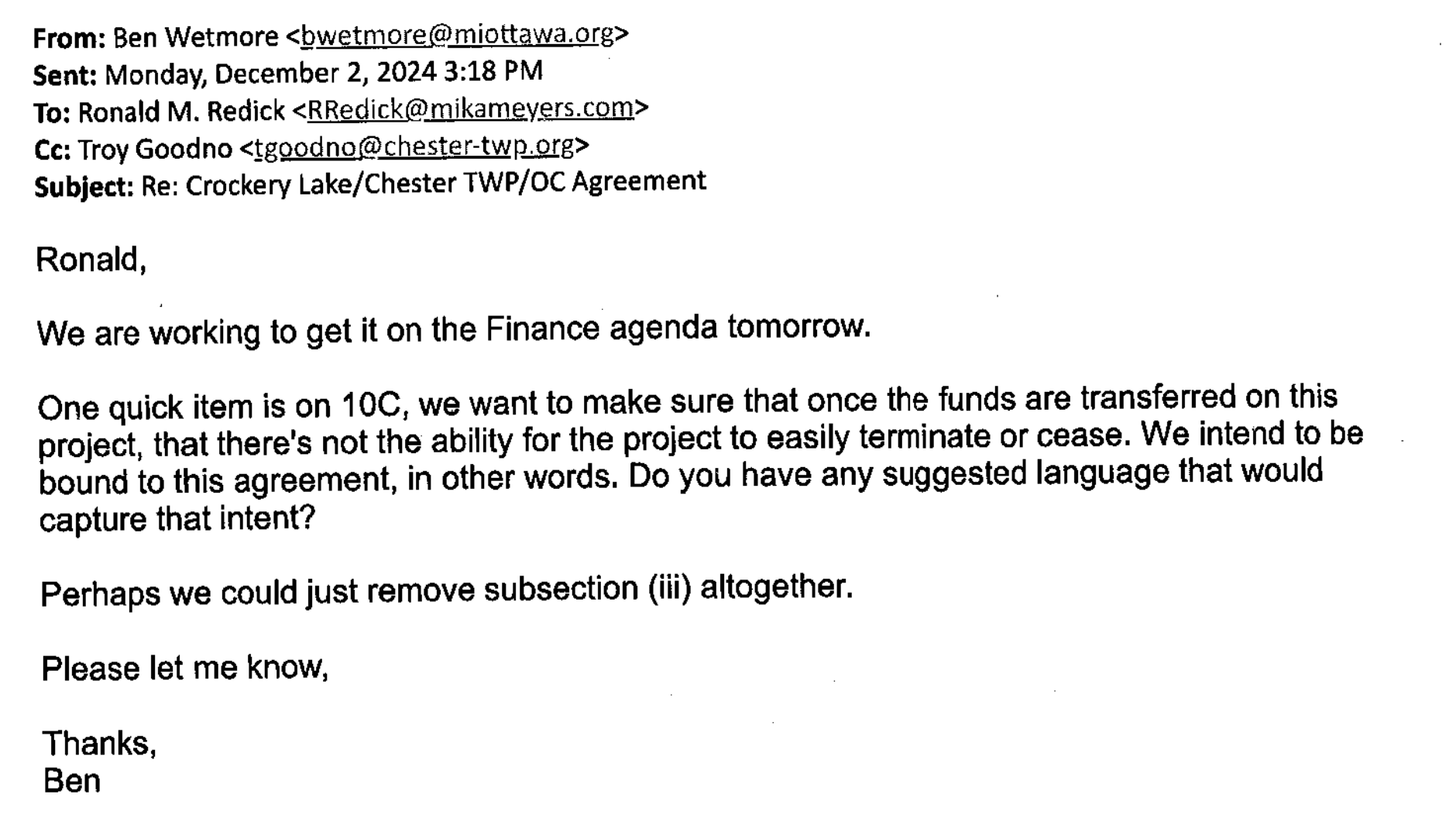
Redick responded: “I have added language to make it even more clear that, (1) the County is obligated to transfer the Funds to the Township after the Effective Date, and (2) once the Funds have been transferred to the Township, they cannot be clawed back by the County or otherwise used for any purpose other than to implement the Project.”
Wetmore then asked Redick to go further.
“Sorry if I'm being dense, but I'm still concerned at this line: ‘... the County cancels or terminates the Project.’ Would there be any objection to dropping it? Providing a complete break clause is not something we want to keep in,” he wrote.
Redick responded: “No, you are not being dense at all. Given your specific concerns, para. 10. can be amended to narrow the grounds for termination for cause.”
The following day was the Dec. 3 Finance and Administration committee meeting, where the OI majority on the committee approved the contract despite flaws pointed out by Bush and his legal counsel.
Indemnification kerfuffle
On Dec. 9, negotiations between the attorneys hit a key snag over the issue of indemnification, where one party compensates another party for losses, damages or liabilities.
The county’s lead attorney David Kallman reviewed the contract and seemingly shared concerns over who would be indemnified in the agreement — an issue that Hissong pointed out Dec. 3.
“David, … I wanted to respond initially to your concern about the indemnity provision, which will be a sticking point, if we cannot solve it,” Redick wrote on Dec. 9 to Kallman, Jordan, Monera and Stephen Kallman.
Fifteen minutes later, Redick sent an addendum to that email, saying the township was insistent on being indemnified and that there were internal concerns with township staff that they were not equipped to handle a project of the scale and scope of the Crockery Lake project.
“It has never been contemplated by the Township Board that the Township would hold the contracts) for the Project. Their understanding was instead that the County would hold the contract(s),” Redick wrote. “Generally speaking, the Township does not consider itself to have the staff or professional training to oversee and hold contracts having this level of technical complexity. It would raise the specter of additional liabilities and costs that may not be covered by the 2% administration fee under para. 4.
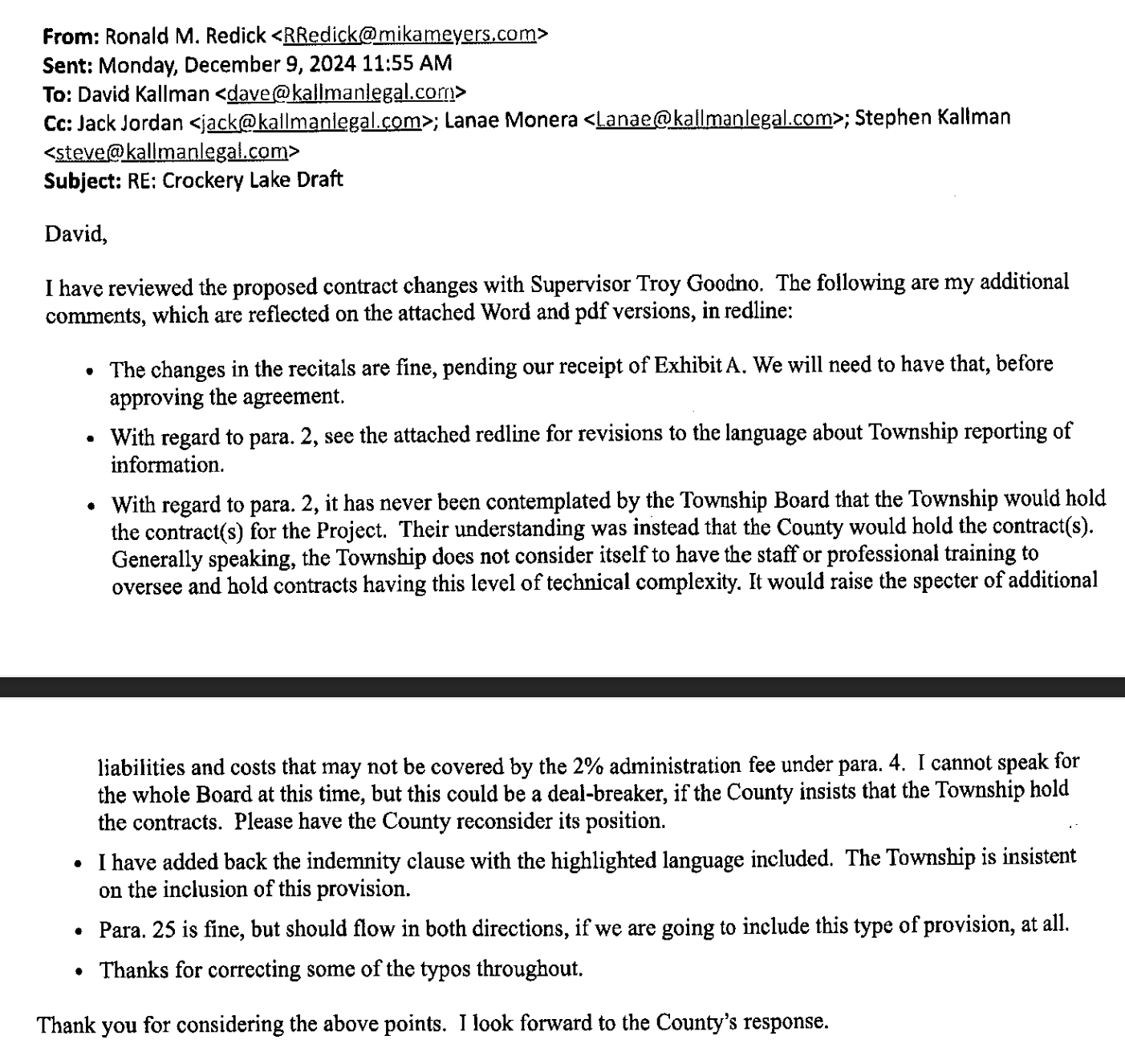
“I cannot speak for the whole Board at this time, but this could be a deal-breaker, if the County insists that the Township hold the contracts. Please have the County reconsider its position,” Redick wrote. “The Township is insistent on the inclusion of this provision.
Hours later, the contract — including language of the county indemnifying the township — was sent to the township, which approved it that night, and the county, which approved it the following day in a split decision.
Legal challenge
The plan has at least one legal challenge that challenges the validity of the agreement.
In a lawsuit filed Dec. 16, Port Sheldon Township resident Dan Zimmer claimed the board exceeded its legal authority in paying the township the entire amount — despite being a five-year remediation plan — so that the current Ottawa Impact majority on the board could complete the deal before losing power.
The lawsuit alleges that a quorum of the commission “met secretly and out of public view either collectively and/or round-robin-style; sent representatives to meet and negotiate with Chester Township officials on behalf of the county without transparency to the entire commission; and purported to agree to commit county funds for the Crockery Lake project, which eventually became the subject of the contract.”
Zimmer’s attorney, Sarah Riley-Howard, said the vote at the Dec. 10 meeting was a fait accompli, or predetermined by the OI-affiliated majority commissioners before the meeting began.
Howard posed two legal challenges to the board’s approval of the contract, claiming commissioners violated Michigan’s Open Meetings Act and because the board does not have the legal authority to conduct a lake-improvement contract.
Support Our Work
Ottawa News Network is a nonprofit news service dedicated to providing the residents of Ottawa County with trustworthy, community-driven news. ONN treats journalism as a public good — something that enriches lives and empowers Ottawa County’s 300,000-plus residents to stay engaged, make informed decisions, and strengthen local democracy. Please consider giving today.
“A county board of commissioners cannot evade its jurisdictional limitations by funneling the entirety of the funds for a lake-improvement project through a township,” Howard wrote, noting that state law dictates that a county board of commissioners may only provide up to 25 percent of the cost of a lake-improvement project on any public inland lake and that a lake board is required and that a special assessment district be completed to help fund the project.
Crockery Lake has not formed a lake board as of publication.
A circuit court judge and the Michigan Court of Appeals declined to grant a temporary restraining order Howard requested to prevent the money from leaving the county’s coffers. She said she plans to appeal the decision.
Read More: Appeals court declines to halt severance payouts to Wetmore, Epperson
In response to the emails made available via the FOIA request, Howard said the internal conversation support the allegations in her client's complaint "that the contract was a done deal before the charade of a vote that the OI majority acted out on December 10."
"It also shows those commissioners who had concerns and opposed it had every reason to object," Howard said Tuesday.

At the Dec. 10 meeting, Commissioner Jacob Bonnema, who publicly split from OI in March 2023, said the indemnification clause in the contract is problematic for the county.
“I see all the liability on us, and I don't see any proof of concept,” said Bonnema, who works in the insurance field. “I would like to see this go back to council and potentially be opened up to a bidding process. I don't know why we've completely stepped over that, because that is a normal good business practice of every county … is to put things out for bid.”
He said the optics on the process don't embody transparency and appropriateness.
“This feels very rushed at the very end,” he said. “I know you're talking about how you've been aware of this since before you were elected, Commissioner Miedema, but why we're choosing a lake in your district in the last minute of this term? I don't think that's very clear.”
Howard echoed those comments Tuesday.
"There is no good reason for the County to pay the Township’s legal fees in drafting a major contract that — supposedly — still had to go through the approval process at a public meeting," she said. "There is no good reason to rush this backroom deal with a Township which acknowledged it didn’t have the capacity to manage this project, other than the obvious one of trying to box in the new Board.
"That isn’t a legitimate motivation to open the County up to this kind of liability, but it explains why the OI majority quickly rolled over on all of the County’s interests before their colleagues on the full Board were included in the discussion," she said.
— Contact Sarah Leach at sleach@ottawanewsnetwork.com. Follow her on Twitter @ONNLeach.





